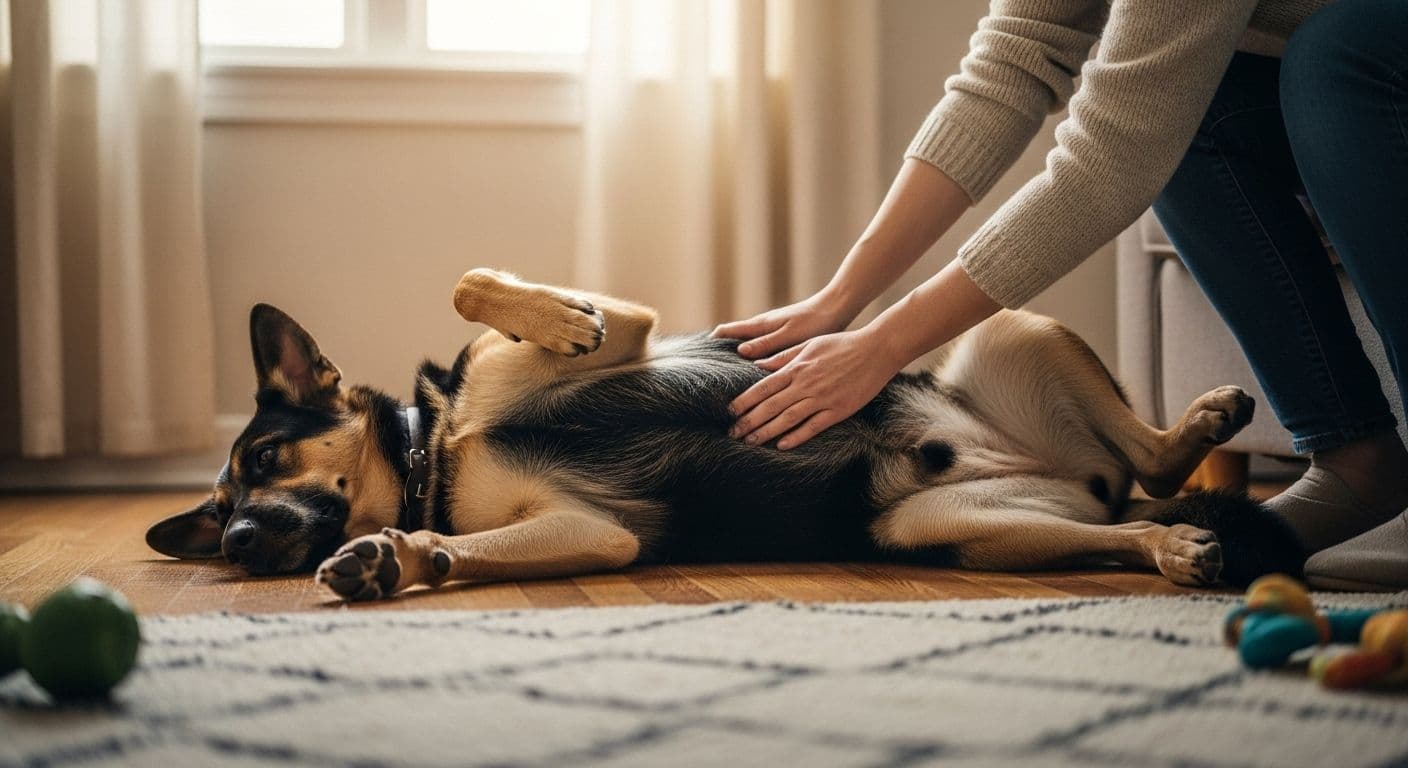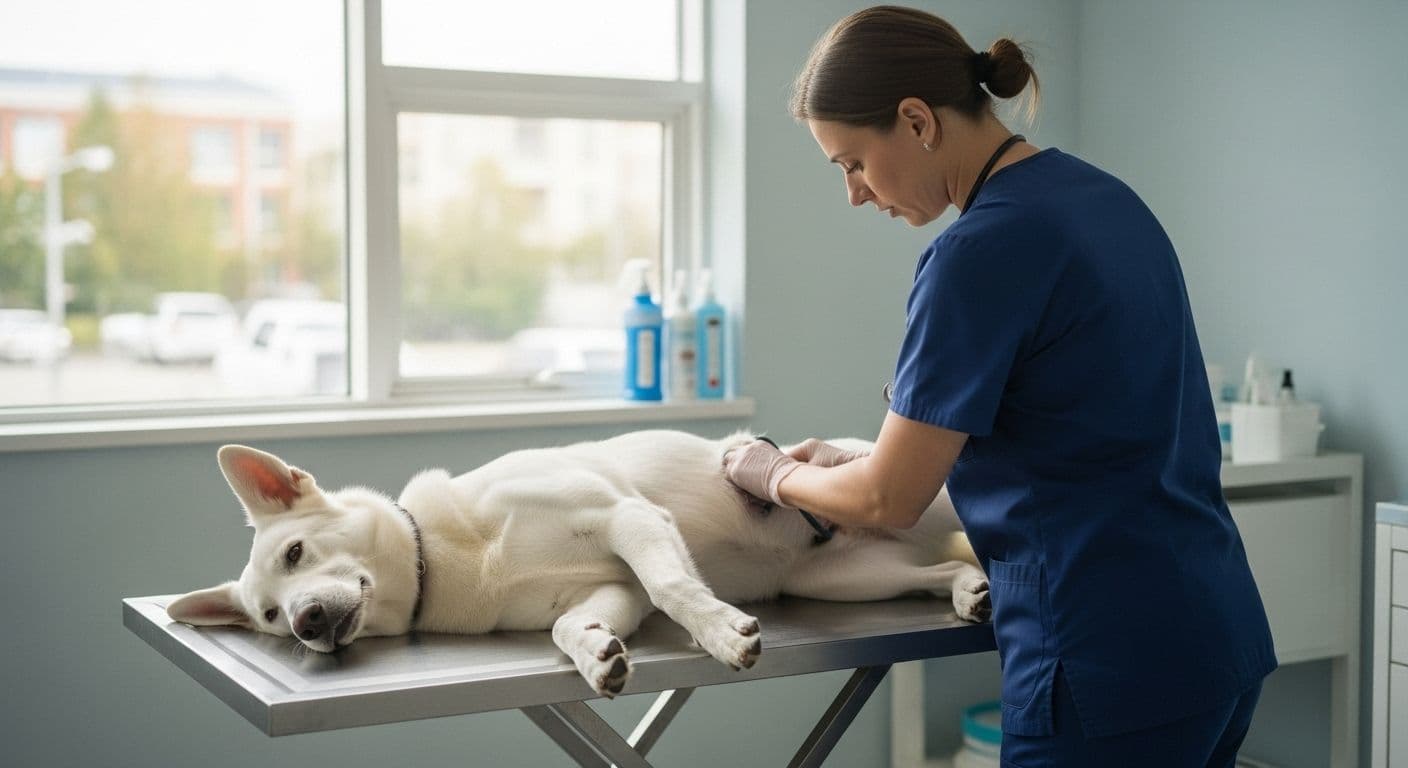Ever been snuggled up on the sofa when—WHOA—your pup’s belly suddenly sounds like a washing machine full of rocks? If your dogs tummy is making loud noises, you’re in good company. Those rumblings (the fancy term is “borborygmi”) run the gamut from totally normal digestion to a true medical SOS. In this step-by-step guide, we’ll unpack why dog bowel sounds happen, how to spot the difference between harmless noise and a brewing crisis, and—most important—what you can do right now to keep your best friend comfy and safe.
Is It Normal When a Dogs Tummy Is Making Loud Noises?

Believe it or not, healthy digestion is noisy. Gas, fluid, and half-digested kibble all slosh through the gut, and every squeeze of intestinal muscle can hiss, pop, or growl. You might hear a puppy stomach gurgling right after its first big meal, a dog’s stomach making noises while sleeping, or a senior dog stomach growling between walks.
Here’s the quick-start checklist:
- Volume and frequency matter. A lone soft gurgle? No sweat. A nonstop drum solo? Pay attention.
- Context helps. Hunger, zoomies after dinner, or a diet switch often explain dogs stomach gurgling without any illness at all.
- Look for sidekicks. Pain, drooling, vomiting, diarrhea, or a dog not eating (stomach gurgling at the same time) bump the situation from “meh” to “call the vet.”
In many pups, an empty stomach at dawn or a late-night table-scrap binge is enough to set off those gastric noises in dogs. Learn your own dog’s normal soundtrack so the odd riff doesn’t send you into panic mode.
Common Causes of Dog Stomach Gurgling
The cause list stretches from totally harmless to genuinely dangerous. Knowing which is which keeps you calm—and your pup safe.
Everyday Reasons
- Hunger contractions – An empty gut pushes air around, creating that hollow echo you hear.
- Eating too fast – Gulped food traps air, cueing dog stomach making noises later on.
- Sudden diet change – Leaping from one brand to another (or doling out spicy leftovers) often equals dogs stomach making loud noises.
- Minor gas build-up – Beans, dairy, or fatty tidbits can fizz and pop, resulting in dog stomach growling that fades once gas passes.
Medical or Dietary Triggers
- Food intolerance or allergy. Chicken, beef, corn, or soy can inflame the gut, generating louder dog bowel sounds, soft stool, and itchy skin.
- Intestinal parasites. Roundworms, hookworms, or giardia give you the classic combo: puppy stomach gurgling, potbelly, messy poop.
- Bacterial or viral gastroenteritis. Picked up a bug at the dog park? Expect noisy cramps plus vomiting or diarrhea.
- Inflammatory bowel disease (IBD). Ongoing irritation leads to recurring dogs stomach gurgling, weight loss, maybe a bit of blood in stool.
- Pancreatitis. A greasy feast can anger the pancreas, sparking severe pain, nonstop retching, and thunderous gut noise.
- Foreign body or obstruction. Sock, stick, Lego—you name it. First there’s gurgling, then silence when the gut shuts down. That’s an emergency.
- Gastric dilatation-volvulus (bloat). Deep-chested breeds that race or gulp air after meals risk a twisted stomach. Fast action saves lives.
Behavioral Clues
Dogs drop hints long before trouble peaks. Watch for:
- Grass eating. A dog stomach gurgling and eating grass might be self-treating mild nausea.
- Refusal of food. “My dog's stomach gurgling like crazy and he won't eat” isn’t a wait-and-see issue—ring your vet.
- Restlessness or prayer pose. Front legs out, rump up? That’s a sign of belly pain.
When the Rumbling Means Trouble
To simplify things, remember: Listen. Look. Time.
- Listen: Louder than normal speech? Repeats every few seconds?
- Look: Pink gums? Bloated belly? Any vomit or diarrhea?
- Time: Loud noises >6 hours, or vomiting/diarrhea >24 hours? Time to call.
Seek urgent care if you notice:
- Retching with nothing coming up – could be bloat.
- Bloody vomit or tarry black stool – internal bleeding alert.
- Extreme lethargy, collapse, or fever – systemic infection or organ trouble.
- Drum-tight abdomen – possible obstruction or GDV.
Even quieter signs, like a dog stomach gurgling not eating breakfast for two days, deserve a chat with your vet. Early help beats a pricey ICU stay every time.
Step-By-Step Relief Plan: What to Give a Dog for a Gurgling Stomach

You’ve ruled out an emergency, and your vet green-lights home care. Follow this roadmap:
- Withhold food for six hours. Let the gut chill out. Offer small sips of water or ice chips so dehydration doesn’t sneak in.
- Introduce a bland diet. Boiled chicken or turkey (no skin, no seasoning) plus plain white rice—about one part meat to two parts rice. Serve one-quarter of a normal meal every four hours.
- Add digestive support.
- Probiotics containing Lactobacillus or Bifidobacterium to balance gut flora.
- Plain canned pumpkin (one teaspoon per 10 lb) for soluble fiber that firms stool and calms gas.
- Slow down eating. Puzzle bowls, muffin tins, or scattering kibble on a sheet pan all curb air gulping—the big culprit behind dog stomach growling.
- Encourage gentle movement. A chill 10-minute leash walk helps gas move along. Skip rough play until the rumble fades.
- Monitor progress. Noise should settle, appetite return, stool look normal within 24–48 hours.
If the “what can I give my dog for gurgling stomach” question keeps popping up, it’s time for deeper detective work—parasite tests, food trials, maybe ultrasound—rather than endless over-the-counter fixes.
Preventing Future Gastric Noises in Dogs
Good habits beat quick cures. Try these:
- Consistent feeding schedule – Two to three evenly spaced meals mute empty-stomach rumbling.
- Gradual diet transitions – Mix new food with old over 7–10 days to dodge dog stomach gurgling triggered by sudden change.
- Quality, balanced nutrition – Pick foods that list meat first and avoid filler ingredients that ferment like crazy.
- Weight control – Extra fluff raises risks for pancreatitis and bloat.
- Regular parasite prevention – Monthly broad-spectrum meds keep roundworms, hookworms, and giardia (all noisy gut makers) at bay.
- Hydration – Fresh water 24/7 keeps things smoothly on the move.
- Enrichment feeding – Snuffle mats, lick mats, treat puzzles slow down gulpers and work the brain.
- Stress management – Thunderstorms, separation anxiety, road trips—use pheromone diffusers or calming routines so nerves don’t upset digestion.
Puppies, deep-chested breeds, and seniors may need extra tweaks. For example, Great Danes often benefit from raised bowls, no roughhousing right after meals, even elective gastropexy surgery—chat with your vet.
When to Call the Vet (and What to Expect)

Think it’s more than simple gas? Here’s your game plan:
- Document everything. When did the noises start? What did your dog eat (including chew toys)? Any meds? Stool color and texture?
- Contact your clinic. Share the sounds, duration, accompanying signs. Mention if you’re seeing dog stomach gurgling and eating grass or dog stomach gurgling not eating.
- Prep for diagnostics. Your vet may run a fecal (parasites), bloodwork (organ function, pancreatitis), abdominal X-ray (foreign body, bloat), or ultrasound (IBD, masses).
- Follow orders to a tee. Whether it’s anti-nausea meds, a hydrolyzed diet, or surgery, strict compliance speeds recovery.
Pet & Animal Care : Home Remedies for a Dog's Stomach Sickness
Quick calls save dogs—and wallets. Never feel silly ringing about “just some noise.” Vets would rather catch trouble early than fight a 2 a.m. crisis.
Telemedicine Tip
Many clinics now offer video consults. A phone recording of the rumble, plus snapshots of posture and gum color, helps your vet decide if you need an in-person visit.
Conclusion: Listening Keeps Them Healthy
When your dogs tummy is making loud noises, treat it like free intel, not instant doom. Learn your pup’s normal gut soundtrack, scan for extra symptoms, and act with a level head:
- Skip fast eating, sudden diet flips, and chew-toy nibbling.
- Offer bland meals, probiotics, and plenty of water for minor upsets.
- Seek professional help pronto if rumbling tags along with pain, vomiting, diarrhea, or appetite loss.
Stay tuned in to those borborygmus broadcasts, and you’ll keep your dog comfortable today—and guard their digestive health for years to come.



